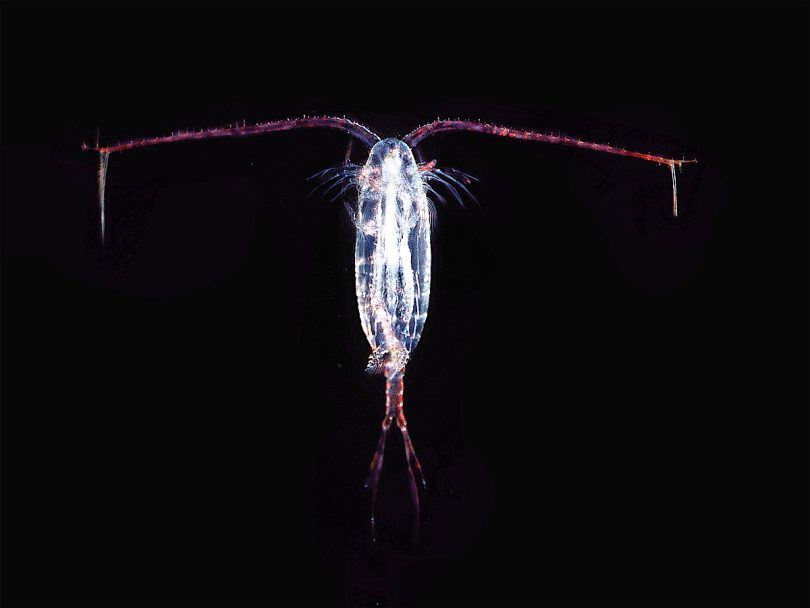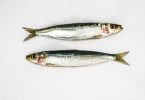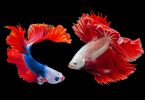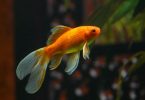Table of Contents
Copepods are tiny crustaceans that are commonly found in marine environments. They are known for their role in the marine food chain, serving as an important food source for many species of fish and other marine organisms. However, in recent years, copepods have become increasingly popular in freshwater aquariums as well.
Many aquarium enthusiasts believe that copepods are beneficial for freshwater aquariums, as they can help to control algae growth and improve water quality.
Copepods are also believed to be a nutritious food source for many species of fish and other aquatic organisms. However, there is still some debate among experts about whether copepods are truly beneficial for freshwater aquariums, and whether they are appropriate for all types of aquarium setups.
Overall, the question of whether copepods are good for freshwater aquariums is a complex one that requires careful consideration of a variety of factors.
In the following article, we will explore the potential benefits and drawbacks of using copepods in freshwater aquariums, and provide expert insights and advice for aquarium enthusiasts who are considering adding these tiny crustaceans to their tanks.
What Are Copepods?
Copepods are fascinating microorganisms that belong to the subclass Copepoda, and they are a vital part of the plankton community in both marine and freshwater environments.
These tiny creatures are usually transparent or translucent, and they have a unique swimming motion that makes them appear almost dance-like. Copepods are exceptionally diverse, with thousands of species identified worldwide.
In freshwater ecosystems, copepods are considered to be a crucial link in the food chain. They consume various organic matter, including algae, detritus, and bacteria, making them excellent scavengers.
Additionally, they serve as a source of food for many aquatic organisms, such as fish and other invertebrates, contributing to the overall health and balance of the ecosystem.
Benefits of Copepods for Freshwater Aquariums
Now that we know what copepods are, let’s delve into why they can be beneficial additions to your freshwater aquarium.
Nutritional Value
One of the significant advantages of having copepods in your freshwater aquarium is their nutritional value. These tiny creatures are packed with essential nutrients that can greatly benefit your aquatic inhabitants.
As copepods graze on algae and other organic matter, they accumulate essential fatty acids, proteins, and vitamins within their bodies.
When your fish and other aquatic organisms consume copepods, they gain access to this rich nutritional source. These nutritious copepods can enhance the health and coloration of your fish, promoting their growth and vitality.
Moreover, copepods are known to have a positive impact on the overall immune system of fish, making them more resilient to diseases.
Natural Food Source
Adding copepods to your freshwater aquarium provides a natural food source that helps mimic the natural ecosystem. In the wild, many freshwater species rely on copepods as a primary food source.
By introducing copepods into your aquarium, you create a more balanced and harmonious environment for your aquatic pets.
Copepods are excellent live food for juvenile fish and small invertebrates. Their small size and active swimming behavior make them an attractive prey item, stimulating natural hunting behaviors in your fish.
This is particularly beneficial for species that are finicky eaters or hard to feed with standard commercial fish foods. By incorporating copepods into their diet, you can ensure that your fish receive the necessary nutrients they need to thrive.
Waste Management
Another noteworthy advantage of having copepods in your freshwater aquarium is their role in waste management. Like all living organisms, fish produce waste, which can contribute to water pollution if not properly managed.
Excessive waste can lead to ammonia spikes, affecting the water quality and, consequently, the health of your aquatic pets.
Copepods play a crucial part in breaking down organic matter and recycling nutrients in the aquarium. As they consume detritus and bacteria, they help prevent the buildup of excess waste and reduce the levels of harmful substances like ammonia and nitrites.
This waste management system, in turn, promotes a healthier and more stable environment for your fish and other aquatic inhabitants.
How to Introduce Copepods into Freshwater Aquariums
Introducing copepods to your freshwater aquarium can be a straightforward process. Before you start, ensure that your aquarium is well-established and equipped to support the addition of copepods. Follow these steps to successfully introduce these beneficial crustaceans:
- Research and Choose the Right Species: First, research and select copepod species that are suitable for freshwater aquariums. Some common freshwater copepod species include Cyclops and Diaptomus. Choose species that are compatible with the existing inhabitants of your aquarium and have similar habitat requirements.
- Purchase Copepods from Reputable Sources: Obtain copepods from reputable aquarium stores or online vendors specializing in aquatic organisms. It’s essential to ensure that the copepods you buy are healthy and disease-free.
- Acclimation Process: Once you have your copepods, it’s crucial to acclimate them properly to their new environment. Place the copepods, along with the water they come in, into a separate container. Slowly add small amounts of your aquarium water to this container over several minutes, allowing the copepods to adjust to the change in water parameters.
- Release the Copepods: After acclimation, gently release the copepods into your freshwater aquarium. To avoid sudden temperature or salinity changes, it’s best to do this process during the day when your aquarium’s temperature is stable.
Maintaining a Healthy Copepod Population
Now that you’ve introduced copepods into your freshwater aquarium let’s explore how to ensure their population thrives, providing various benefits to your aquatic ecosystem:
- Feeding Copepods: Copepods are primarily filter feeders, meaning they consume tiny particles and microorganisms in the water column. To promote a healthy copepod population, ensure that your aquarium has an ample supply of phytoplankton and other microorganisms for them to feed on. Consider using a high-quality liquid phytoplankton supplement to provide copepods with the essential nutrients they need.
- Habitat Requirements: Creating a suitable habitat is crucial for copepod survival. Copepods thrive in aquariums with ample hiding spots like live rocks, aquatic plants, and crevices. These hiding spots not only provide a safe refuge for copepods but also contribute to a well-balanced and natural-looking aquarium.
- Water Quality: Regularly monitor and maintain the water quality of your aquarium. Copepods are highly sensitive to fluctuations in water parameters, especially ammonia and nitrite levels. Perform routine water tests and water changes to ensure a stable and healthy environment for copepods and other tank inhabitants.
- Avoid Overstocking: While copepods are beneficial, it’s essential not to introduce an excessive number of copepods into your aquarium. Overstocking can lead to resource competition, potentially causing an imbalance in the ecosystem. Start with a small number of copepods and allow them to reproduce and establish a sustainable population naturally.
Potential Risks and Considerations
When considering adding copepods to your freshwater aquarium, it’s essential to be aware of the potential risks and challenges they might bring to the ecosystem.
While copepods are generally harmless and beneficial, there are a few aspects to keep in mind before introducing them to your aquarium.
1. Overpopulation
Copepods have a remarkable ability to reproduce rapidly under favorable conditions. While a moderate copepod population can contribute to a thriving ecosystem by acting as a natural food source for fish and other aquatic organisms, an unchecked population growth can lead to overpopulation.
When copepods become overly abundant, they may compete with other species for food and resources, disrupting the ecological balance.
Moreover, excessive copepod numbers might result in water quality issues, such as an increase in ammonia and nitrate levels, which can be harmful to fish.
To avoid copepod overpopulation, it’s crucial to monitor their numbers regularly. If you notice a significant increase in copepods, consider reducing their population through manual removal or providing more predation opportunities for fish that feed on them.
2. Compatibility with Other Species
While copepods are generally compatible with most freshwater aquarium species, it’s essential to consider the specific inhabitants of your tank.
Some fish species might prey on copepods as part of their natural diet, which could affect the copepod population and the overall ecosystem balance.
On the other hand, certain fish species and other aquatic organisms can peacefully coexist with copepods and benefit from their presence.
Before introducing copepods, research the compatibility of your existing aquatic community. Ensure that the copepods will not be a source of stress or disturbance to other tank inhabitants.
If you have fish that actively consume copepods, be prepared to supplement their diet to maintain a healthy copepod population.
Conclusion
In conclusion, copepods can be a valuable addition to freshwater aquariums, providing natural cleaning services and serving as a nutritious live food source for various fish species.
Their presence in the aquarium ecosystem can indicate a healthy balance and contribute to the overall well-being of the tank’s inhabitants.
When introducing copepods to your freshwater aquarium, it’s essential to select the appropriate species, establish a suitable habitat, and monitor their population to ensure they don’t become overabundant.
By doing so, you can harness the benefits of copepods and create a harmonious and thriving aquatic environment for your beloved fish and plants. Happy aquarium keeping!







